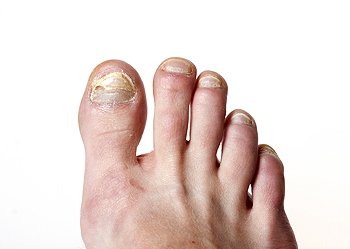Connect With Us
Blog
October 2024

Toenail fungus, or onychomycosis, is caused by fungi that invade the nail bed, leading to thick, discolored, and brittle nails. Symptoms often include yellow or white streaks under the nail, a foul smell, and in severe cases, pain or detachment of the nail. Thickened toenails can also result from trauma, poor circulation, or other medical conditions. If you notice significant discoloration, pain, or the nail lifting from the bed, it is important to consult a podiatrist, as persistent or severe infections often require medical attention. This type of doctor can provide prescription antifungal medications or recommend laser therapy, depending on the severity of the condition. If you have toenail fungus or thick toenails, it is suggested that you schedule an appointment with a podiatrist for a comprehensive evaluation and effective treatment options.
For more information about treatment, contact one of our podiatrists of Greater Boston Foot Care, PLLC. Our doctors can provide the care you need to keep you pain-free and on your feet.
Toenail Fungus Treatment
Toenail fungus is a condition that affects many people and can be especially hard to get rid of. Fortunately, there are several methods to go about treating and avoiding it.
Antifungals & Deterrence
Oral antifungal medicine has been shown to be effective in many cases. It is important to consult with a podiatrist to determine the proper regiment for you, or potentially explore other options.
Applying foot powder on the feet and shoes helps keep the feet free of moisture and sweat.
Sandals or open toed shoes – Wearing these will allow air movement and help keep feet dry. They also expose your feet to light, which fungus cannot tolerate. Socks with moisture wicking material also help as well.
If you have any questions please feel free to contact our office located in Plymouth, MA . We offer the newest diagnostic tools and technology to treat your foot and ankle needs.

Plantar fasciitis is a painful condition caused by inflammation of the plantar fascia, a thick band of tissue that runs along the bottom of the foot, connecting the heel to the toes. This condition often results in sharp heel pain, especially with the first steps in the morning or after prolonged sitting. Common causes include overuse, wearing improper footwear, obesity, and tight calf muscles. To alleviate symptoms, a variety of treatment options are available. Custom orthotics can provide support and redistribute pressure, while night splints help keep the foot in a stretched position during sleep. Taping techniques and specific exercises can also strengthen the foot and improve flexibility. If you are struggling with heel pain or suspect you have plantar fasciitis, do not hesitate to seek professional help. It is suggested you schedule an appointment with a podiatrist who can assess your condition and tailor a treatment plan to get you back on your feet comfortably.
Plantar fasciitis can be very painful and inconvenient. If you are experiencing heel pain or symptoms of plantar fasciitis, contact one of our podiatrists from Greater Boston Foot Care, PLLC. Our doctors can provide the care you need to keep you pain-free and on your feet.
What Is Plantar Fasciitis?
Plantar fasciitis is the inflammation of the thick band of tissue that runs along the bottom of your foot, known as the plantar fascia, and causes mild to severe heel pain.
What Causes Plantar Fasciitis?
- Excessive running
- Non-supportive shoes
- Overpronation
- Repeated stretching and tearing of the plantar fascia
How Can It Be Treated?
- Conservative measures – anti-inflammatories, ice packs, stretching exercises, physical therapy, orthotic devices
- Shockwave therapy – sound waves are sent to the affected area to facilitate healing and are usually used for chronic cases of plantar fasciitis
- Surgery – usually only used as a last resort when all else fails. The plantar fascia can be surgically detached from the heel
While very treatable, plantar fasciitis is definitely not something that should be ignored. Especially in severe cases, speaking to your doctor right away is highly recommended to avoid complications and severe heel pain. Your podiatrist can work with you to provide the appropriate treatment options tailored to your condition.
If you have any questions please feel free to contact our office located in Plymouth, MA . We offer the newest diagnostic and treatment technologies for all your foot and ankle needs.

As people age, foot care becomes increasingly important to maintain mobility and comfort. Common issues among the elderly include bunions, corns, and blisters. Blistering skin lesions on the feet of the elderly can be a common and concerning issue. These lesions, often filled with fluid, can result from various factors, including friction, pressure, and decreased skin integrity associated with aging. The skin of elderly individuals tends to become thinner, drier, and more fragile over time, making it more susceptible to damage and blister formation. If left untreated, blistering skin lesions can increase the risk of infection and other complications, particularly in elderly individuals with compromised immune systems. If you are elderly and experiencing such blisters, it is suggested that you schedule an appointment with a podiatrist for a proper diagnosis and treatment.
Proper foot care is something many older adults forget to consider. If you have any concerns about your feet and ankles, contact one of our podiatrists from Greater Boston Foot Care, PLLC. Our doctors can provide the care you need to keep you pain-free and on your feet.
The Elderly and Their Feet
As we age we start to notice many changes in our body, but the elder population may not notice them right away. Medical conditions may prevent the elderly to take notice of their foot health right away. Poor vision is a lead contributor to not taking action for the elderly.
Common Conditions
- Neuropathy – can reduce feeling in the feet and can hide many life-threatening medical conditions.
- Reduced flexibility – prevents the ability of proper toenail trimming, and foot cleaning. If left untreated, it may lead to further medical issues.
- Foot sores – amongst the older population can be serious before they are discovered. Some of the problematic conditions they may face are:
- Gouging toenails affecting nearby toe
- Shoes that don’t fit properly
- Pressure sores
- Loss of circulation in legs & feet
- Edema & swelling of feet and ankles
Susceptible Infections
Diabetes and poor circulation can cause general loss of sensitivity over the years, turning a simple cut into a serious issue.
If you have any questions please feel free to contact our office located in Plymouth, MA . We offer the newest diagnostic and treatment technologies for all your foot and ankle needs.

Foot pain can originate from various sources, depending on which part of the foot is affected. Pain in the heel, often attributed to conditions like plantar fasciitis or Achilles tendinitis, can result from excessive stress or inflammation. The ball of the foot may hurt due to metatarsalgia or neuromas, often caused by high-impact activities or wearing poor footwear. Pain in the arch can indicate issues such as flat feet or arch strain. Toe pain, on the other hand, might be due to bunions, hammertoe, or gout, conditions that affect toe alignment or joint health. Each area of the foot can be vulnerable to specific problems, so identifying the precise location and nature of the pain is vital for effective treatment and management, ensuring relief and improved mobility. If you have pain in one or more areas of your foot, it is strongly suggested that you contact a podiatrist who can offer you effective treatment solutions.
Foot Pain
Foot pain can be extremely painful and debilitating. If you have a foot pain, consult with one of our podiatrists from Greater Boston Foot Care, PLLC. Our doctors will assess your condition and provide you with quality foot and ankle treatment.
Causes
Foot pain is a very broad condition that could be caused by one or more ailments. The most common include:
- Bunions
- Hammertoes
- Plantar Fasciitis
- Bone Spurs
- Corns
- Tarsal Tunnel Syndrome
- Ingrown Toenails
- Arthritis (such as Gout, Rheumatoid, and Osteoarthritis)
- Flat Feet
- Injury (from stress fractures, broken toe, foot, ankle, Achilles tendon ruptures, and sprains)
- And more
Diagnosis
To figure out the cause of foot pain, podiatrists utilize several different methods. This can range from simple visual inspections and sensation tests to X-rays and MRI scans. Prior medical history, family medical history, and any recent physical traumatic events will all be taken into consideration for a proper diagnosis.
Treatment
Treatment depends upon the cause of the foot pain. Whether it is resting, staying off the foot, or having surgery; podiatrists have a number of treatment options available for foot pain.
If you have any questions, please feel free to contact our office located in Plymouth, MA . We offer the newest diagnostic and treatment technologies for all your foot care needs.

Sever's disease, also known as calcaneal apophysitis, is an overuse injury that affects the growth plate in the heel of growing children and adolescents, usually between the ages of eight and 15. It occurs when repetitive stress or pressure on the heel bone, often from sports or physical activities, causes inflammation and pain in the heel. Sever's disease is common in children who are physically active and going through growth spurts, as the bones grow faster than the muscles and tendons, leading to increased tension on the heel. It manifests as heel pain, swelling, and tenderness, particularly during or after physical activity. Treatment focuses on reducing activity levels and wearing supportive footwear or orthotics. Most children outgrow the condition once their bones stop growing. If your child has heel pain that is persistent, it is suggested that an appointment be made with a podiatrist for a proper diagnosis and treatment to alleviate pain.
Sever's disease often occurs in children and teens. If your child is experiencing foot or ankle pain, see one of our podiatrists from Greater Boston Foot Care, PLLC. Our doctors can treat your child’s foot and ankle needs.
Sever’s Disease
Sever’s disease is also known as calcaneal apophysitis, which is a medical condition that causes heel pain I none or both feet. The disease is known to affect children between the ages of 8 and 14.
Sever’s disease occurs when part of the child’s heel known as the growth plate (calcaneal epiphysis) is attached to the Achilles tendon. This area can suffer injury when the muscles and tendons of the growing foot do not keep pace with bone growth. Therefore, the constant pain which one experiences at the back of the heel will make the child unable to put any weight on the heel. The child is then forced to walk on their toes.
Symptoms
Acute pain – Pain associated with Sever’s disease is usually felt in the heel when the child engages in physical activity such as walking, jumping and or running.
Highly active – Children who are very active are among the most susceptible in experiencing Sever’s disease, because of the stress and tension placed on their feet.
If you have any questions, please feel free to contact our office located in Plymouth, MA . We offer the newest diagnostic and treatment technologies for all your foot and ankle injuries.

